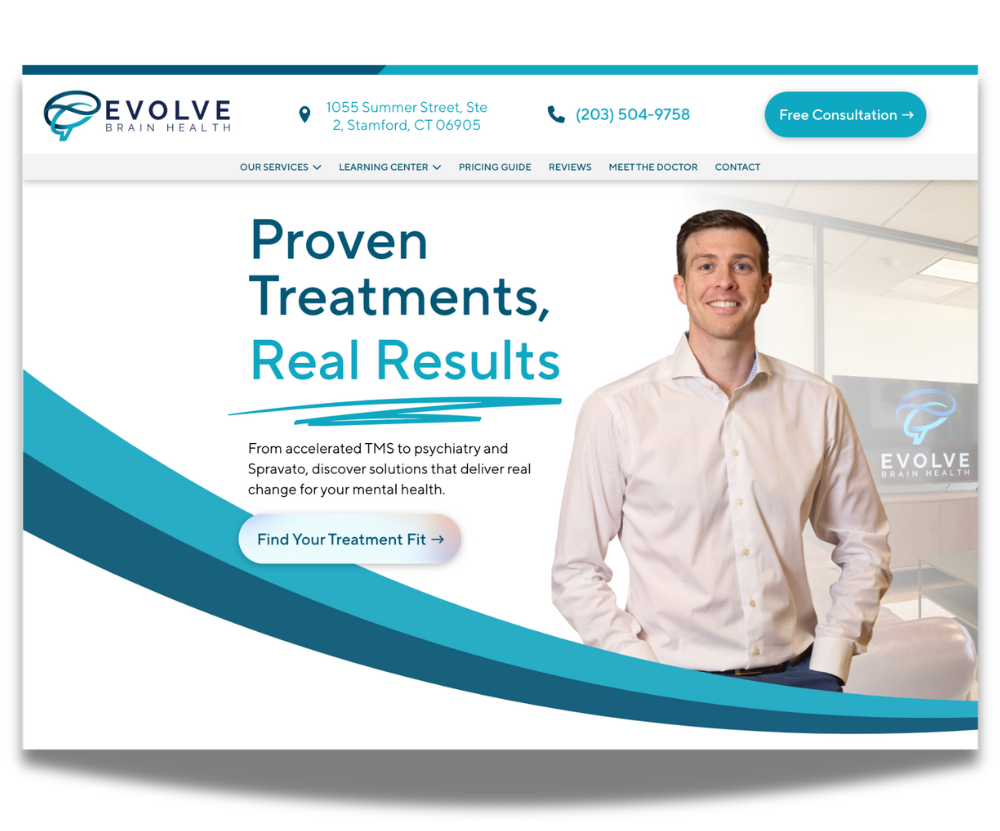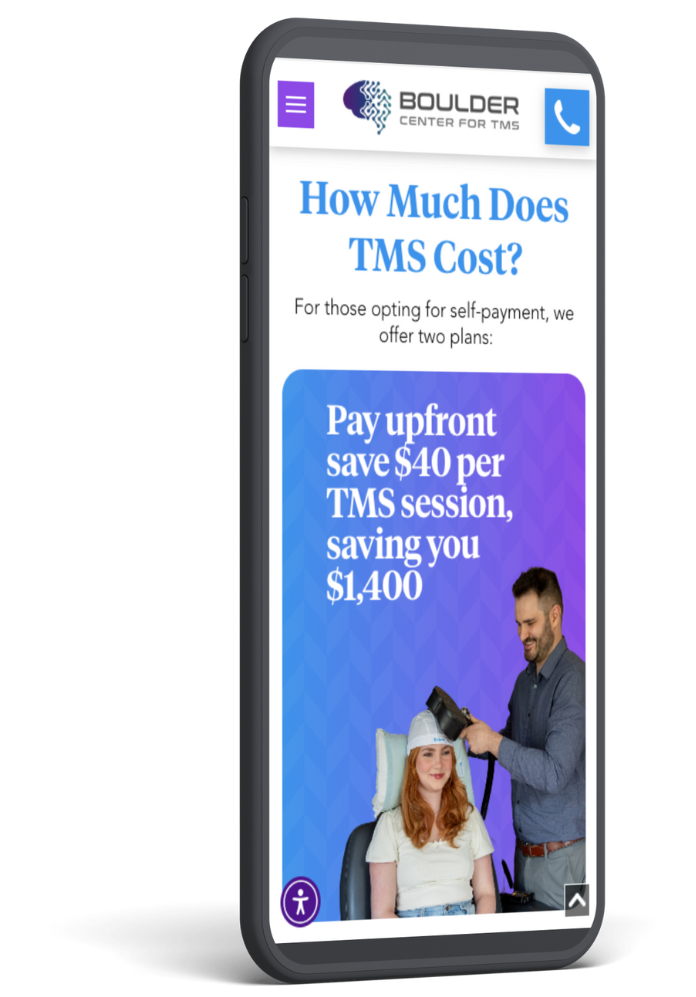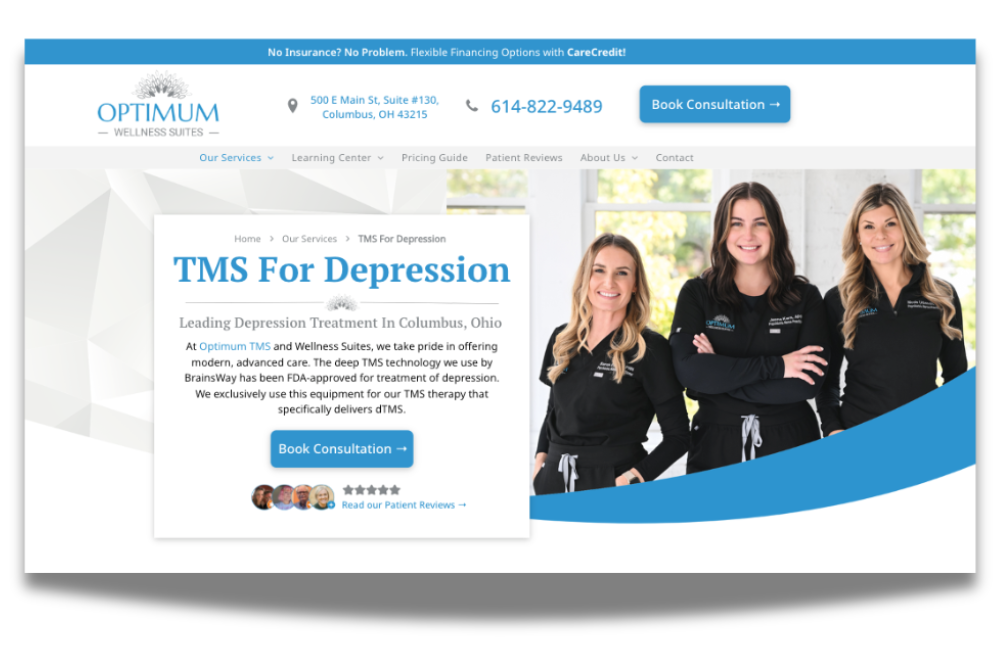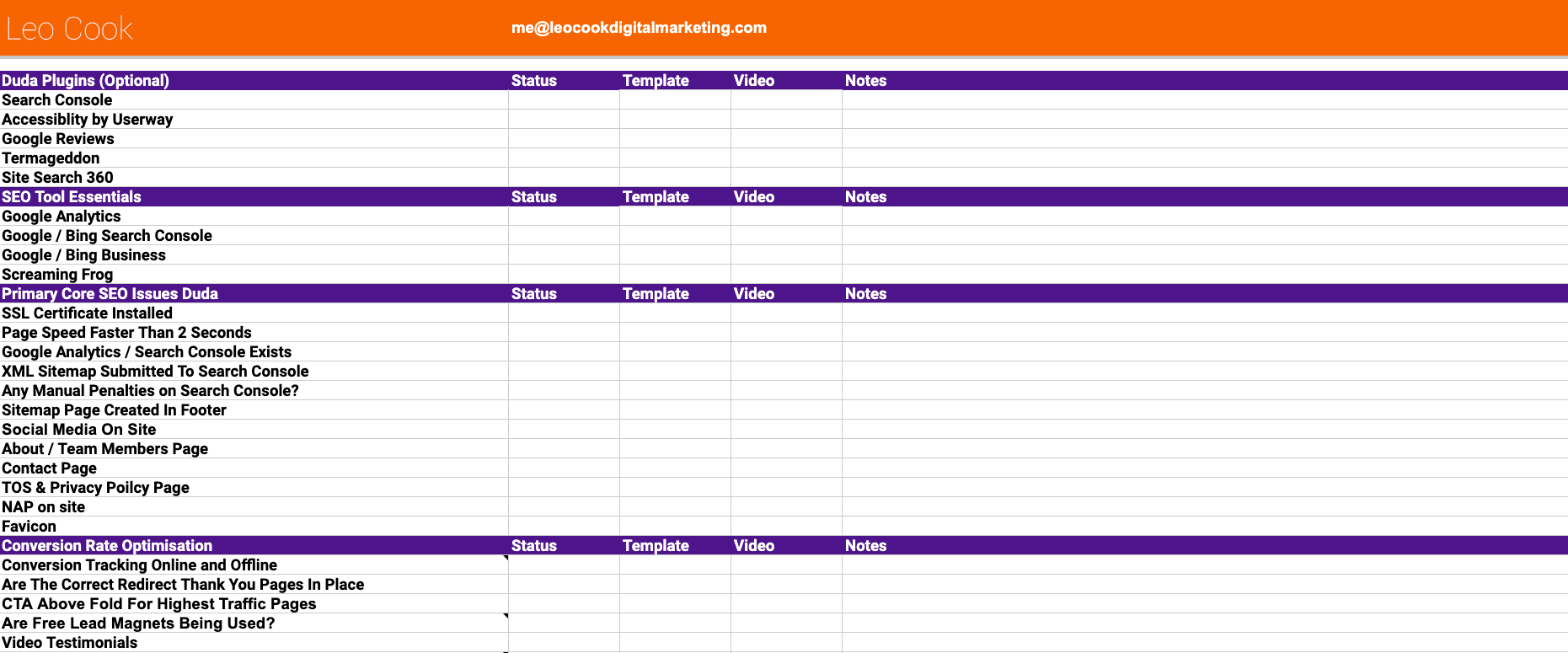Request a Free Website Audit
Technical SEO audit which addresses issues such as site redirects, SSL, indexation, sitemaps, robots.txt, call to actions, design, page speed, schema markup, citations, and more. Once I have identified all foundational issues, I will provide a list of my recommendations.

Transcranial Magnetic Stimulation (TMS) clinics provide a critical service for individuals suffering from depression and other mental health conditions. With the increasing demand for mental health services, it's vital for TMS clinics to have a strong online presence. Patients suffering from treatment resistant depression need to be informed on TMS as it's still very much unknown, we can achieve this through effective website design and digital marketing which is built around
'they ask, you answer' methodology.
These are key components in attracting and retaining patients. This article explores how TMS clinics can optimise their websites and leverage SEO and digital marketing to enhance visibility and reach.
The What is "They Ask You Answer"? How Can It Be Applied to My TMS Clinic?
A well experienced marketing expert and someone I respect greatly is
Marcus Sheridan, who developed this simple yet profound concept: by addressing customer questions and concerns through transparent and educational content, businesses can build trust and authority. I used this ideology to help multiple TMS clinics gain success online, keeping in mind the public still need to be educated on TMS therapy. Here are some key principles of "They Ask, You Answer":
Customer-Centric Content:
Focus on addressing the real questions and concerns that potential customers have. Instead of traditional sales pitches, create content that educates and informs.
(i.e Is TMS shock therapy?, How much does your TMS cost?)
Transparency and Honesty:
Be open about your products and services, including pricing, reviews, potential drawbacks, and comparisons with competitors. Transparency builds trust and helps customers make informed decisions.
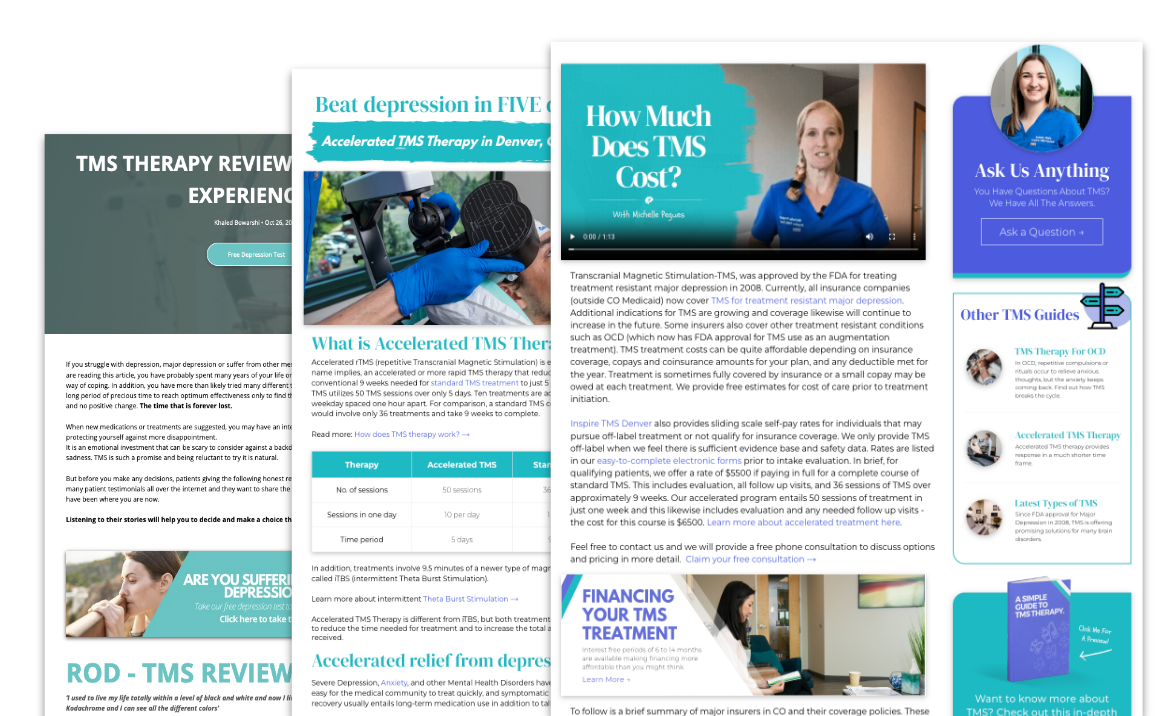
Educational Approach:
Position your business as a teacher. Provide valuable, educational content that helps customers understand their problems and the solutions you offer.
Utilise Various Content Formats:
Leverage blogs, videos, e-books, and other formats to reach a wider audience and cater to different learning preferences and improve engagement rates with your website. Here's an example!
Answer Every Question:
No question should be ignored, no matter how trivial or challenging it might seem. By thoroughly addressing all potential inquiries, you become the go-to resource in your industry.
Inbound Marketing Focus:
Shift from outbound marketing techniques to inbound marketing. Attract customers through helpful content rather than pushing messages through traditional advertising.
Commitment to Consistency:
Consistently produce and update content to keep your audience engaged and informed. Regular updates show that your business is active and continuously improving.
The Importance of Website Design for TMS Clinics
A well-designed website is more than just visually appealing; it serves as a digital front door for your clinic. Here are key elements of effective website design for TMS clinics:
1. User-Friendly Navigation
Patients visiting your site should find it easy to navigate. Ensure that your menus are intuitive and that important information (such as services, reviews, pricing, about and appointment booking) is easily accessible.
2. Responsive Design
With many users accessing websites via mobile devices, having a responsive design is crucial. Your site should look and function well on smartphones, tablets, and desktops. We develop all of our sites on Mobile first keeping Google's mobile friendly guidelines in mind.
3. Professional Aesthetic
Your website should reflect the professionalism and care of your clinic. Use real high-quality images of the staff, office and patients. A clean layout and consistent branding. For previous TMS clinics we've setup press releases, added their profile to key business directories, improved online reputation and featured this on their website to build trust and credibility.
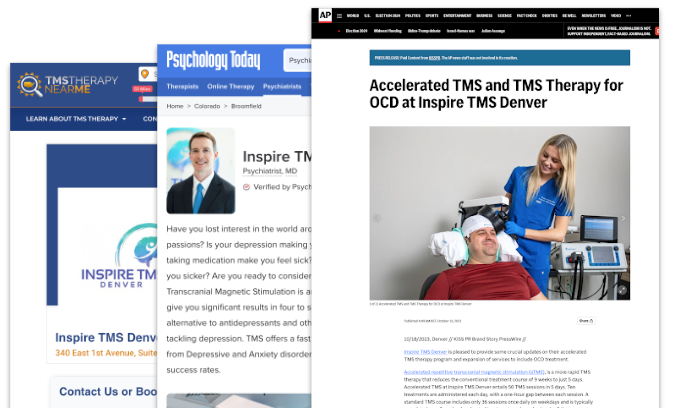
4. Clear Call-to-Actions and Patient Resources (CTAs)
Effective CTAs guide visitors towards taking specific actions, such as scheduling a consultation or opting in for a free TMS guide. Ensure your CTAs are clear, prominent, and strategically placed (i.e on mobile we'd add click to calls within the navigation bar) For Inspire TMS Denver we integrated free insurance/eligibility quizzes, downloadable guides and consultations to help educate users, improve time on page and build our email marketing list.
5. Patient Resources
Provide valuable resources such as blog articles, FAQs, and educational content about TMS therapy. This not only helps with SEO but also positions your clinic as an authority in mental health treatment.
SEO Marketing Strategies for TMS Clinics
SEO (Search Engine Optimisation) is a set of strategies designed to improve your website’s visibility on search engines such as Google and Bing. Here are some essential SEO marketing strategies tailored for TMS clinics:
1. Keyword Research
Identify the keywords potential patients use when searching for TMS therapy, learning about it or wanting to know more about your clinic. Focus on both broad and specific terms (e.g., "How much does TMS Cost?" and "TMS clinic in [Your City]" or "Accelerated TMS near me").
2. On-Page SEO
Optimise each page of your website with relevant keywords in the title tags, meta descriptions, headers, and content. Ensure your site’s content is informative and answers the questions your potential patients might have. I conduct free website audits for clinics that currently have websites, if you'd a like a list of issues and my personal recommendations for your site
click here
→
3. Local SEO
Most patients will be looking for local TMS sessions, so optimising for local search is critical. Create and optimise your Google My Business profile and include your clinic’s name, address and phone number (NAP) on every page of your site. Continue to create multiple local service pages focused on a specific keyword (i.e "TMS for OCD in [Your City]") Furthermore continue to create local business directories, social profiles and feature in local press. Also,
BUILD REVIEWS. I can't express how important your online reputation is, I've run review email campaigns for previous clinics and this has boosted our marketing efforts massively.
4. Content Marketing
Regularly publish high-quality, informative content related to TMS therapy, mental health and your clinic. This could include blog posts, case studies, patient testimonials, and educational videos. This not only improves your SEO but also helps in building a connection with your audience.
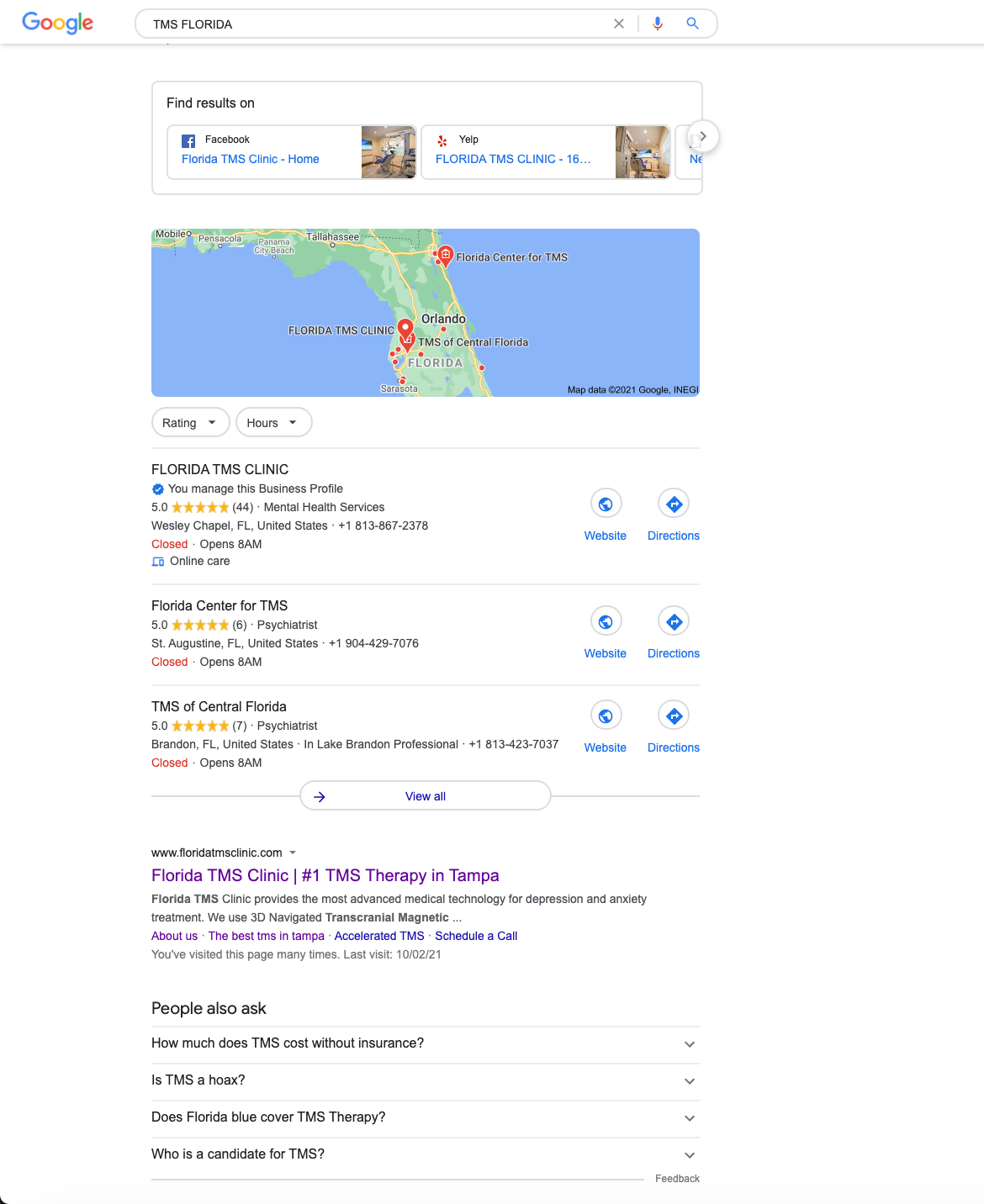
5. Link Building
Earn or set aside a budget for backlinks from reputable sources to improve your site’s authority. This could include guest posts, collaborating with mental health organisations, and getting listed in online directories.
6. Technical SEO
Ensure your website loads quickly, is secure (HTTPS), and has a clean URL structure. Use tools like Google Search Console and Google Analytics to monitor user behaviour and fix any technical issues that could affect your search rankings. These are just few aspects of technical SEO, check out my latest article on
SEO optimising Duda websites for more info!
Combining Website Design and SEO for Optimal Results
For TMS clinics, a holistic approach to website design, SEO and online advertising can yield the best results. Here are some tips on integrating all three:
1. Content and Design Integration
Ensure your SEO-optimised content is presented within a well-designed, user-friendly interface. Good design keeps visitors on your site longer, reducing bounce rates and improving SEO.
2. Regular Updates:
Keep your website content and design updated. Use HotJar Regularly add new blog posts, update service pages, and refresh the site's design elements to keep it engaging and current.
3. Conversion Rate Optimisation and SEO:
A great user experience goes hand in hand with SEO. Optimise your website’s speed, mobile usability, build quizzes, videos and overall functionality to ensure visitors engage with your site.

4. Paid Advertising
Complement your organic SEO efforts with targeted paid advertising. Use pay-per-click (PPC) campaigns, social media ads, and display ads to attract more visitors to your well-designed and optimized website. Paid advertising can help drive immediate traffic, particularly for competitive keywords and new services, enhancing your overall marketing strategy.
Request a Free Website Audit
Technical SEO audit which addresses issues such as site redirects, SSL, indexation, sitemaps, robots.txt, call to actions, design, page speed, schema markup, citations, and more. Once I have identified all foundational issues, I will provide a list of my recommendations.
